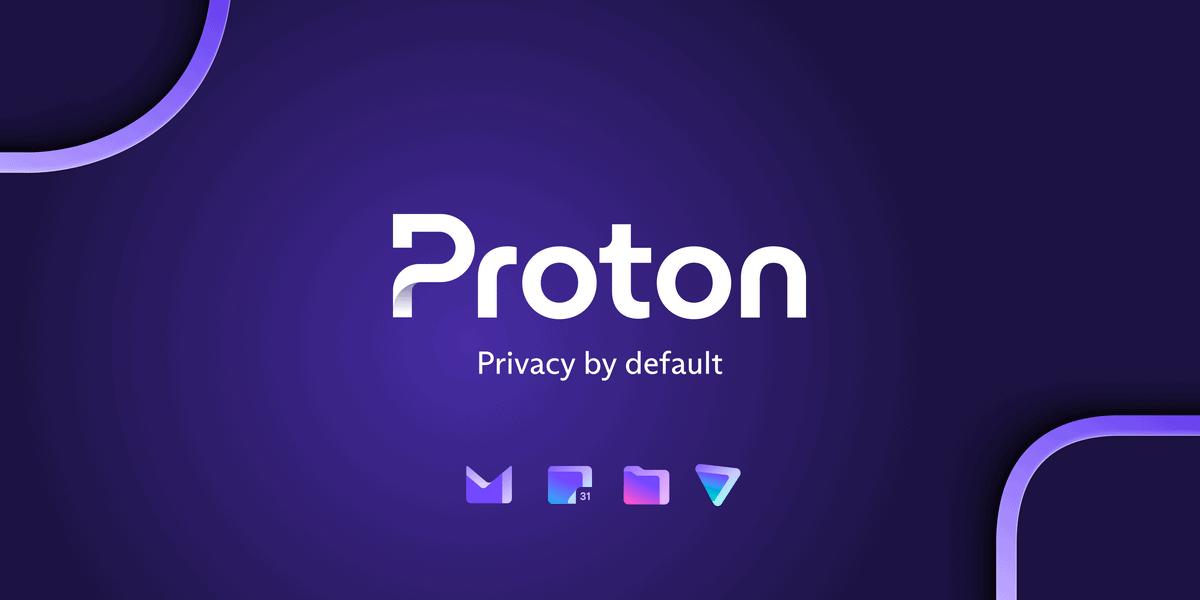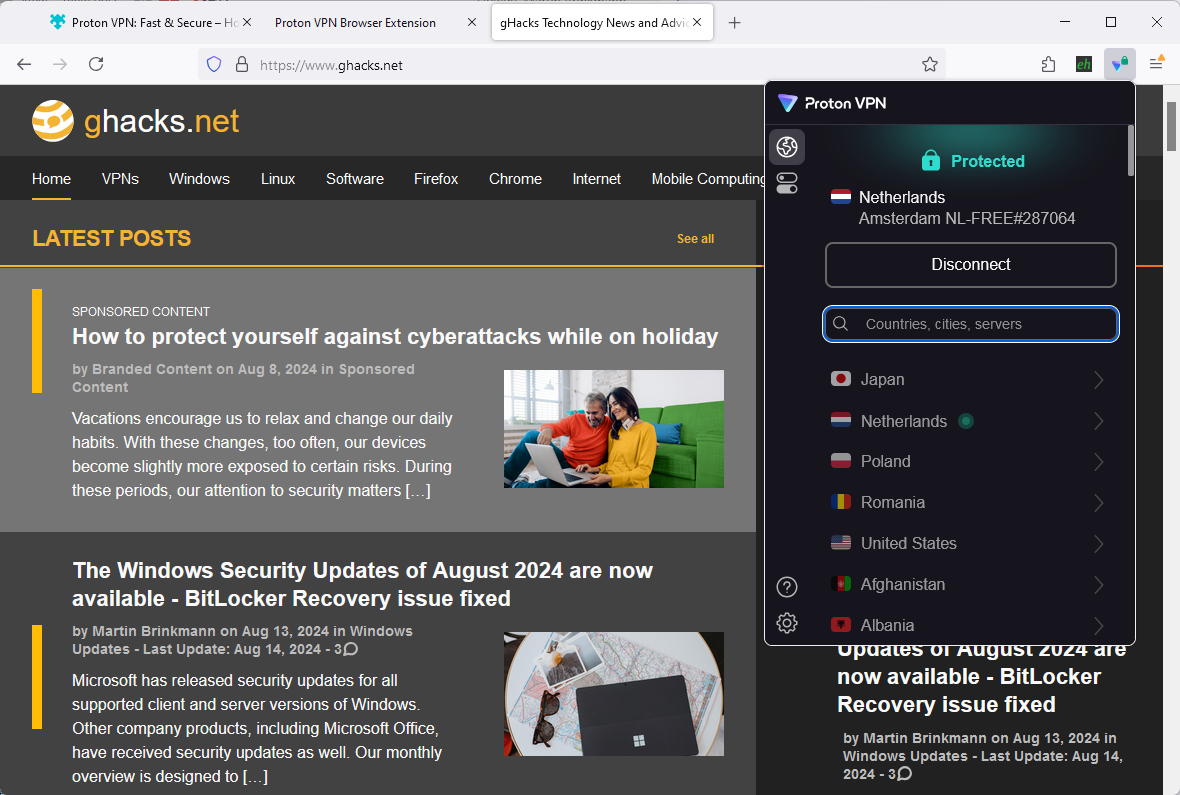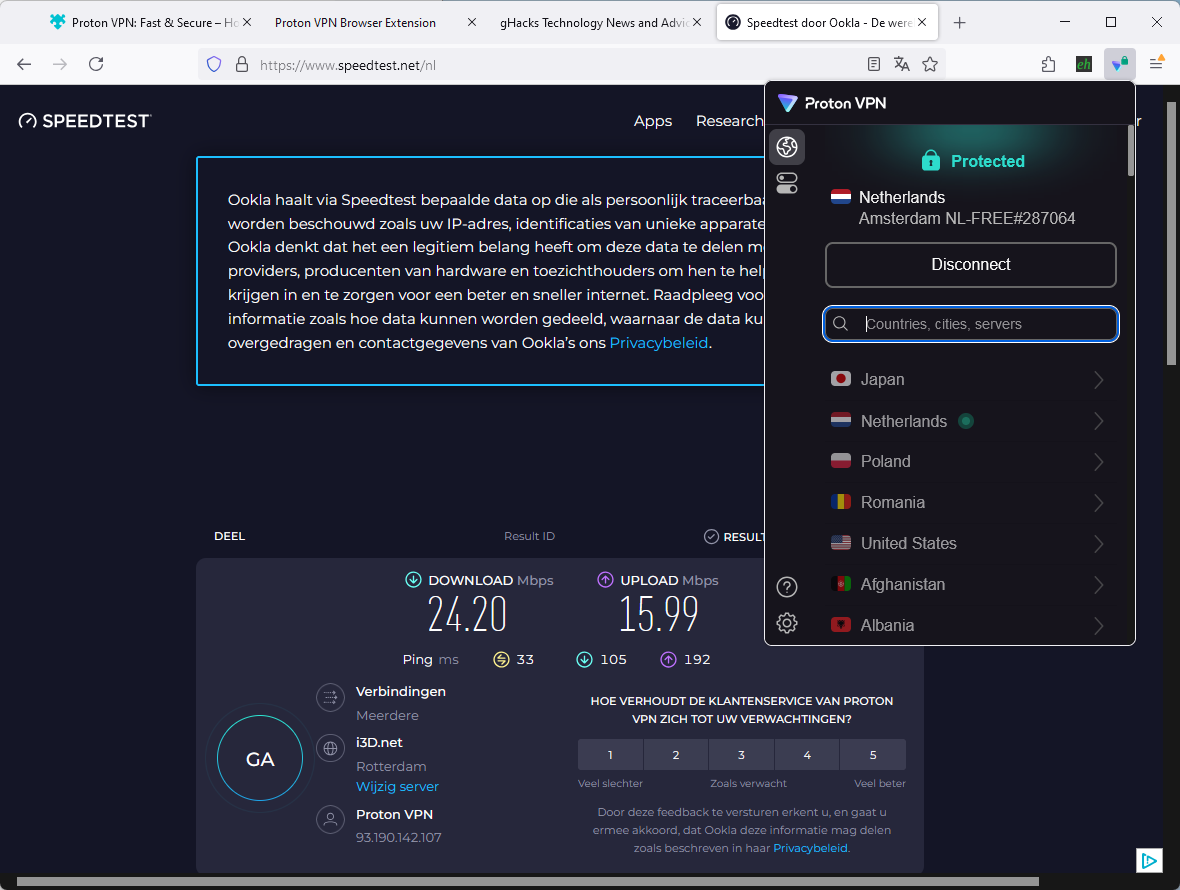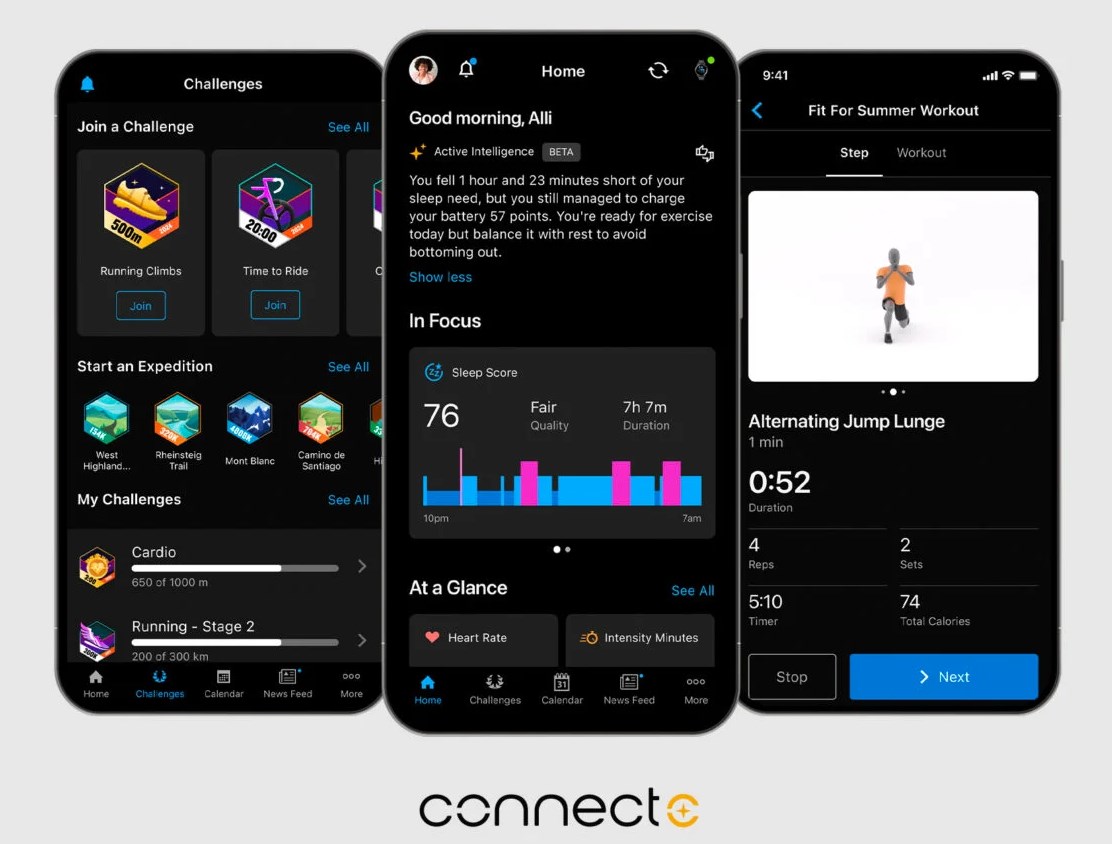Proton VPN: free VPN users can use the browser extensions now

Proton announced today that it has made the decision to allow free users of its service to use the Chrome and Firefox extensions. Up until now, access was limited to paying customers.
Here are the details:
- Proton VPN is available as a free, limited version.
- The browser extensions may now also be used by free users.
Note: Proton VPN is compatible with most Chromium-based and Firefox-based browsers.
Proton says that access to browser extensions was a much requested feature. Using a browser extension offers some advantages:
- The VPN connection applies only to the browser.
- The Proton VPN app does not need to be installed.
Access to VPN apps may be blocked in some regions. The extension may still work, however.
Proton VPN Free

The free version of Proton VPN is limited, but not as much as most other free VPNs. The developers promise that theirs is the only solution that "doesn't limit your bandwidth, spy on your, show you privacy-invading ads, or sell your data".
Some features are off-limits when you use the free version. This includes:
- The ability to select a specific country / server to connect to.
- The highest possible speeds.
- Split Tunneling support.
- Custom DNS support.
- Advanced features, including ad-blocking, malware protections, VPN acceleration, or double-hop support.
Using the free browser extensions is very easy. If you have a Proton VPN account already, you just download the extensions for your browser and sign-in with your account. All done.
If you do not have a Proton VPN account yet, you can create one for free using two steps:
- Provide an email address on the "Create your account" page.
- Accept the pre-generated password or set a custom one.
That is all to it. No verification of the email address during setup.
The extensions are available here:
Using the extension

Some features that are not available are shown in the user interface. These are either darker than the rest or use the upgrade icon (which contains a plus-symbol).
Activate the icon of the extension and hit the connect button to connect to the VPN network. Note that you cannot pick a server, but that a fast nearby server is selected automatically. This can be in another country, but does not have to be. It took less than a second to connect to the VPN during tests.
A click on the features icon shows the available features. These are:
- Auto Connect - enabled by default. Connects to the VPN automatically when the browser is started.
- WebRTC Leak Protection -- prevents that the device's IP address is leaked using WebRTC.
- Notifications -- Displays a notification for connect and disconnect events.
A click on the settings icon displays two options:
- Share anonymous usage statistics -- Disabled by default.
- Share anonymous usage crash reports - Enabled by default.
You can toggle the settings there.
The speed of the VPN was quite good during tests. On a not--so-great wireless connection, I got about 24 Mbps download and 16 Mbps upload. Sufficient for most tasks on the Internet.
Upgrades to Proton VPN Plus are available for $4.49 per month if paid when you subscribe for two years.
Closing Words
The Proton VPN browser extension works well. Compared to the majority of free VPN solutions, it is a much preferred option, considering that it does not include the negatives that come along with many free VPNs. To name a few: tracking, ads, upsell popups, bandwidth limits, selling of user data.
Free users of Proton VPN have two options now: use the dedicated VPN app on their device, or use the browser extension. Note that free is limited to one device at a time.
All in all, this improves an already-great option for users who want to protect their Internet connection and thus privacy further.
Do you use VPN solutions? If so, which do you use and why? Let us know in the comments down below.



















ProtonVPN used to be the best free service until they went corporate and started lying to us, for example they decided to stop letting users choose the country they wish to connect to and now they are constantly connecting free users to the most heavily used servers instead of the ones with less users as they say in the reasoning for the change…
We get a nag screen each time the program is started prompting us to upgrade to paid services.
Previously free features ware removed and now only available to paid subscribers despite the promise that this is due to an error and will be back in the next version …
P.S. Instead of optimizing the program they are removing free features and limiting functionality under the pretense of better user experience while constantly nagging us with popups promoting paid services and making the free user experience worst. Also many of the reviewers are being given limited paid accounts for testing that offer a completely different user experience then the average free user gets…
I just installed the Proton extension in Brave yesterday, as it is the best I could find to replace what I actually want to use – KProxy. I’ve been using KProxy for years, but it will not let me upgrade because of the PayPal page not working to add credits through KProxy’s website. I did write to support ahead of running out of credits, but no response. The Proton extension is my current choice because Proton is legit and download and upload speed is normal.
in the free plan the bandwidth *is* limited!
I tried downloading 5gb files and after a while the download speed dropped to 200 kb/s.
still good for a free plan thought.
Proton VPN leaks DNS, look it up!
If misconfigured all VPN leak DNS. Anything else?
The extension is only necessary to allow additional split tunneling between browser and OS, but is not required to use the vpn service. Neither is an app required. Pure wireguard alone suffices.
Maybe this release is aimed to Venezuela’s people. Good alternative and easier for most people.
I wish Brave Browser had a free VPN proxy built-in like Opera Browser does. Maybe Brave developers can strike a deal with Proton and have the Proton VPN extension built into Brave Browser OOTB which will work similar to Opera Browser’s free VPN proxy does. It will create competition with Opera Browser and give a more privacy focused free VPN proxy.
Apparently not all Proton VPN web pages for US use are updated yet, as HELP is contradictory in places and I could not ever validate login attempts. I had to uninstall which went well. Odds favor my errors but I gave up after trying an hour.
Apparently similar issues here.
Created the Proton account, installed the Proton VPN Firefox extension.
Extension required of course to login. Problem here is that the extension sends the login process to the developer’s page, whilst other extensions handle the login by themselves, connect to the required server but handle the response within themselves, without a cookie, given I’m assuming the Proton login confirmed the login with a cookie (forgot to check that), otherwise I just don’t understand.
Given I use the ‘Temporary Containers’ extension in ‘Automatic Mode’ the successful login was all in the containerized tab. I would have had to set an exception for the login page, which I haven’t tried given I do not want cookies to wander about anywhere else than in a container.
Removed the extension, deleted the account (which by the way REQUIRED an at least 30 character explanation, which I find rude).
In the regard of the login process, Windscribe was far more easier, intuitive, immediate.
Proton and its services may be top-notch but this is the second time I encounter complications with the Swiss brand : 1st time was with the basic free email service which bombarded me with so many recalls about the advantages of the payed plan that I finally abandoned it. This would not mean that Proton is problematic, but maybe only that some software, applications, extensions, if excellent in their payed versions/plans, may not be as valuable when offered for free.
Anyway, had to give it a try. Was only a touch ‘n’ go. No frustration given VPNs are definitely not my cup pf tea.
I’ve used Windscribe’s VPN at one time, only as it’s Firefox extension. Worked flawlessly and the speeds were more than acceptable for a free plan (I had provided an email to the required free plan registration to allow an increased monthly allowance). I later removed the extension (easy account deletion) for two reasons :
1- I practically never used it. Moreover having to pause it when accessing sites handling confidential user data was bothering : I’d never connect via a VPN to a site where I have a login registration, even if no confidential data is concerned.
2- I was receiving far too many emails reminding my lazy brains all the advantages of a paid plan.
I may have a try on Proton’s Free VPN Firefox extension, not sure though given VPN is definitely not much of a concern. The Proton brand does have a solid reputation of seriousness, though some may disagree, yet some are suspicious natively, so i’m sure of nothing, as practically always :)
Thanks for the article, Martin, documented as always.
#2 That’s one use for mail rules.
I have a Proton mail account and tried it when they first offered it free. For the amount I use a VPN and the reason I would use it (watch videos unavailable to my country), it wasn’t worth fiddling with. I watch something else instead.
I use the Proton .ovpn certs and OpenVPN. One would have to try the option to realize all the benefits. Yes, great “free” VPN. I like the app as well. Wondering . . . guess I’ll try the FF extension.
We do use VPN. Saying which would kind of defeat the purpose no?
I think the most important thing is we are not forced to use some app or extention.
The windscribe extension also allows use of other vpn protocols such as OpenVPN, and the others. It is very configurable optjonal adblocking, split tunneling and bypass for locality restriction among the many options in settings.
If using their native vpn you get 2gb free, free with email gets 10 gb and if you socialmedia it 15gb.
Great little app and is available on most platform’s and browsers.